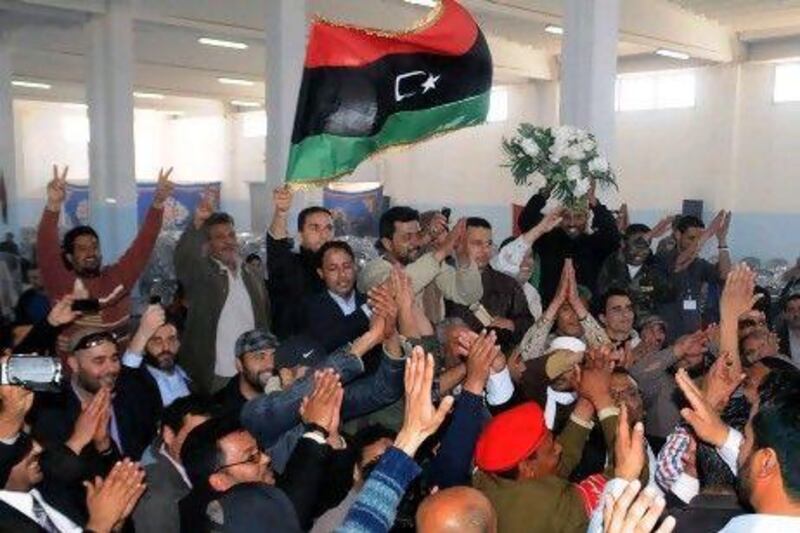TUNIS // Libya's interim government will defend national unity "with force" if necessary, National Transitional Council (NTC) chairman Mustafa Abdel Jalil vowed yesterday.
His warning came a day after leaders in the eastern city of Benghazi declared a semi-autonomous region encompassing most of the country's oil riches.
The NTC and the interim government have struggled to assert their authority since the fall of Muammar Qaddafi in August
It is unclear if the push for autonomy for the region to be called Barqa will succeed, how popular it is, or what exactly it means.
The Benghazi leaders say they would leave defence, foreign affairs and oil in the control of the central government.
But for Libya's interim leaders, it underscores their shaky grip on control. Many of the militias that helped topple Qaddafi remain and some have carved out areas of control in the capital, Tripoli, and largely run their home regions.
Mr Abdel Jalil has called for talks with leaders in Benghazi, whom he said had been manipulated by unnamed countries and the remnants of the Qaddafi regime.
"I call on my brothers, the Libyan people, to be aware and alert to the conspiracies that are being plotted against them and to be aware that some people are dragging the country back down into a deep pit," he said on Tuesday.
While leaders in Tripoli warn of attempts to divide Libya, analysts say discontent in Benghazi, a former power base whose influence waned as Qaddafi built up Tripoli, hinges primarily on money.
Almost seven months after the collapse of Qaddafi's regime, Libya's second city is still strapped for cash to start building anew.
A congress of tribal and militia leaders on Tuesday named Ahmed Al Zubair Al Senussi, a relative of Libya's former king, to head the Cyrenaica Transitional Council The area was historically known as Cyrenaica and its Arabic name is Barqa.
The Barqa council is meant to "administer the affairs of the province and protect the rights of its people", according to an eight-point declaration.
"We are not talking about changing the flag or national anthem," said Fadl-Allah Haroun, a tribal and militia leader.
"We are talking about different administration, a parliament and managing the financial affairs."
That initiative springs most likely from impatience with leaders in Tripoli, analysts said. Since Qaddafi's regime collapsed, interim leaders have spent little on transport, health, education, and other public services.
"First Benghazi was marginalised by Qaddafi, and now the government's not really up and running, and we're still waiting for a new budget," said Sami Zaptia, an economist and business consultant based in Tripoli.
Even with a budget, the government lacks mechanisms to disburse money quickly to cities and state institutions, said John Hamilton, a Libya expert at British risk analysis firm Control Risks.
A year after launching the revolt that toppled Qaddafi, the city has seen no improvement in daily life, he said.
"What Benghazi and Cyrenaica need is more money for infrastructure projects and economic development."
Some Libyan funds abroad have been unfrozen and oil production stands at 1.4 million barrels a day, approaching a pre-war level of 1.8 million barrels daily.
Libya is still awaiting details of a new budget submitted to the NTC last month by the interim government, said Mr Zaptia.
That budget's publication alone should inspire more patience, Mr Zaptia said, noting also a government announcement on Tuesday that militias in eastern Libya had relinquished control of sea and airports to Tripoli.
For now, the call in Benghazi for autonomy appears to have received mixed reviews. About 3,000 people took part in Tuesday's congress, but several hundred people protested in the city that evening with placards reading, "No to Federalism," Reuters reported.
"Things are still evolving, but for now there is apparently not a groundswell of support," Mr Zaptia said.
There is, however, historical precedent. Carthaginian, Roman, and Arab frontiers sliced through modern-day Libya, which existed in later centuries as the separate domains of Tripolitania in the west, Cyrenaica in the east, and the desert interior of Fezzan.
Benito Mussolini's Italy hammered those regions into a single colony. After the Second World War ended Italian rule, a 1949 constitution for Cyrenaica became a template for independent Libya's first constitution establishing in a federal monarchy in 1951 under King Idris.
On Monday, Libya's interim prime minister, Abdurrahim El Keib, said on the TV programme Meet the Minister that federalism would set the country back by 50 years.
Idris' reign ended in 1969 with his overthrow by Qaddafi, who spent the next four decades pouring Libya's oil wealth into his hometown, Sirte, and Tripoli, to the detriment of other cities including Benghazi.
It was in Benghazi that revolt against Qaddafi erupted last year.
Today, interim authorities planning for elections scheduled in June have seen their authority flaunted by Libya's militias, many of which refuse orders to surrender their weapons.
Meanwhile, several cities have held local elections, giving their leaders arguably more democratic legitimacy than the NTC-appointed interim government, said Mr Hamilton.
While Benghazi's new council is self-appointed, its call reflects impatience across Libya with the pace of development.
"The solution would be temporary budgets to get money to local authorities," Mr Hamilton said. "But I don't see that happening. Instead, I think there will be more of these unilateral declarations."
jthorne@thenational.ae
* With additional reporting by Reuters, Agence France-Presse and the Associated Press





